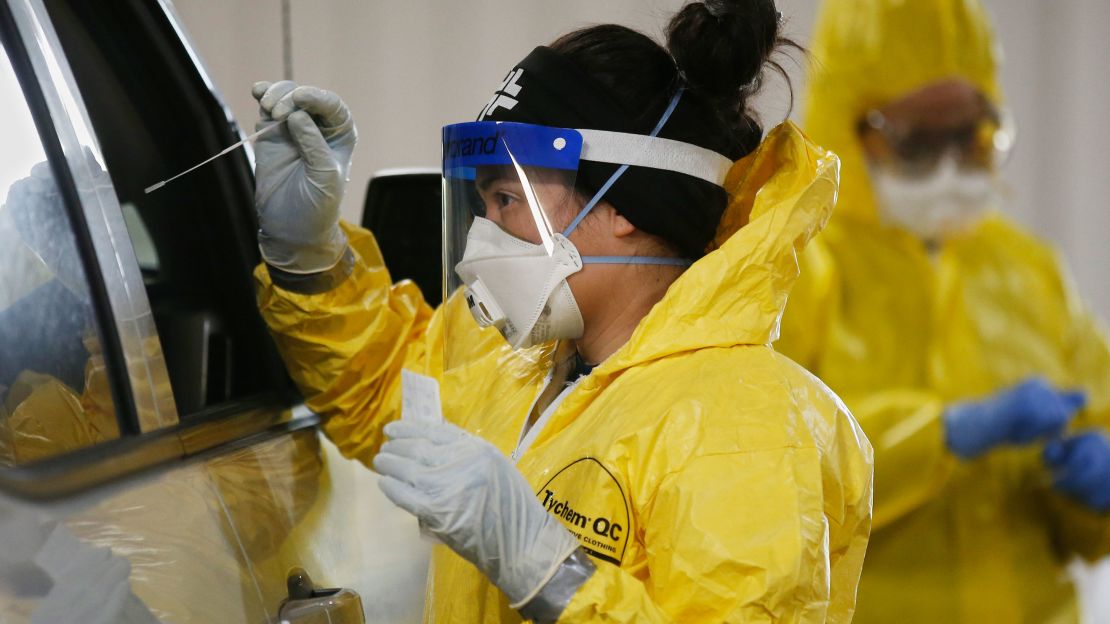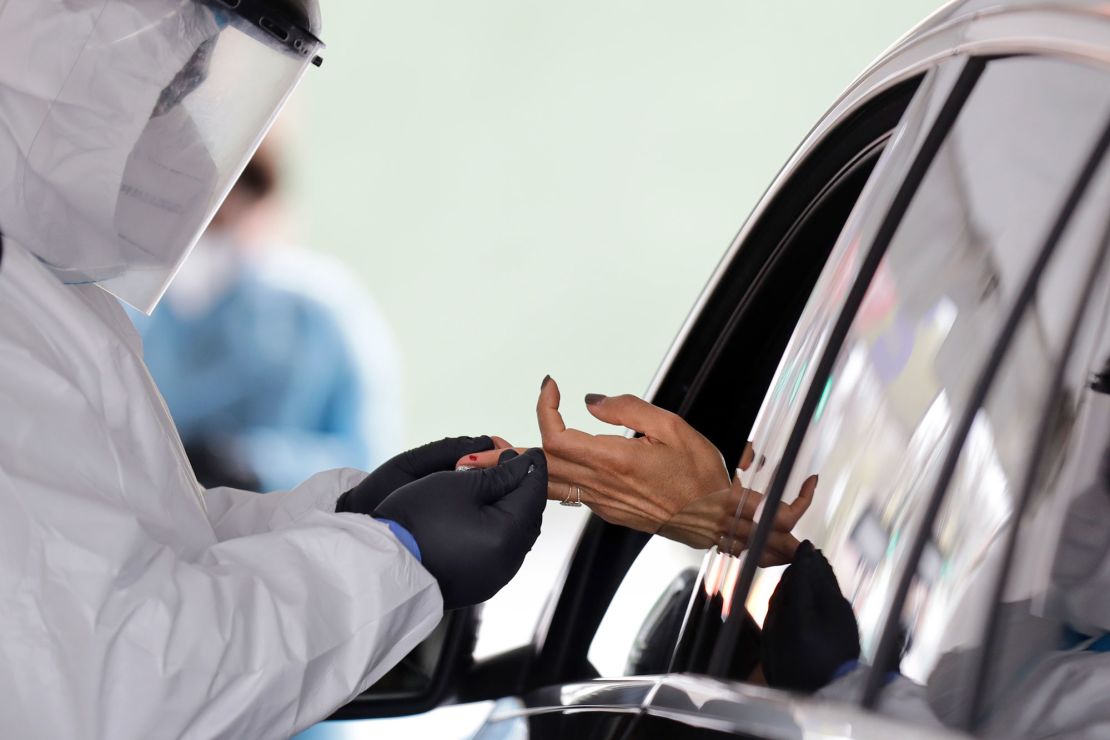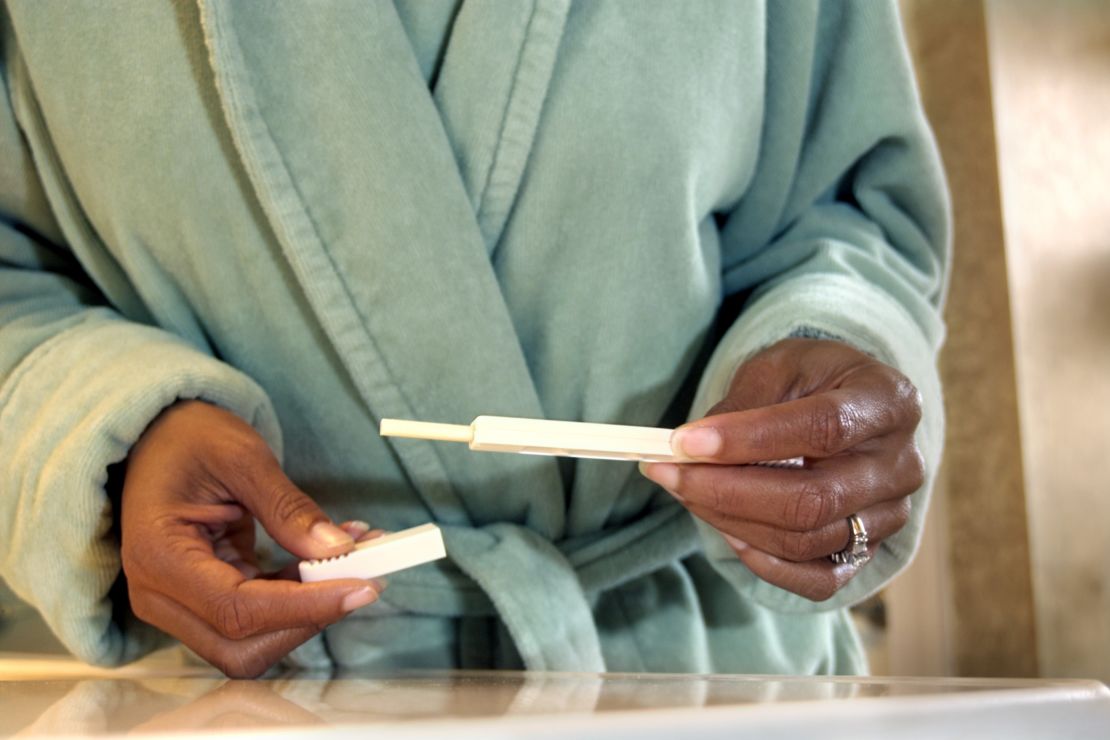One is widespread but has key shortages across its supply chain.
One remains questionably reliable and is only helpful after the fact.
And one is still early in development – but could speed up and simplify results.
Experts say ramping up the use of these three different types of coronavirus tests – the PCR test, the antibody test and the antigen test, respectively – is essential to reopening America’s shuttered economy safely.
Despite the need, the availability of testing remains in frustratingly short supply and is dependent on individual states and local health care providers rather than the federal government. And increasing that availability of testing is difficult because of significant scientific and logistical issues.
Here’s a look at each of the three main tests, their strengths and weaknesses, and the holdups that have slowed their rapid mass production.
PCR tests

What are they?
Polymerase chain reaction tests, known as PCR, are the most common and most accurate tests for determining whether someone is currently infected with the novel coronavirus.
How do they work?
Every virus has a unique genetic code. The novel coronavirus PCR test works by starting with a throat swab or sputum sample from a patient, amplifying that specimen in a machine, and then looking for unique coronavirus genetic material.
First, a health care worker takes a swab or sputum sample from the back of the patient’s throat or nose, generally using a long thin nasopharyngeal swab. That swab is stored in a sterile tube or vial and is then sent to a lab that has access to a test kit.
There, trained lab technicians extract any genetic information from the specimen. The purified genetic material is then mixed with materials, including some derived from the coronavirus itself, that are known as reagents.
The entire solution is then placed into a testing machine about the size of a toaster. If a patient’s specimen contains coronavirus, then the virus’s genetic material will be amplified, and the machine will return a positive result. And if the specimen has no coronavirus, there will be a negative result.
The whole process generally can be measured in days, though the time to get a result is shorter if hospitals or clinics have test kits in-house.
Why is this test important?
The PCR test is the most widespread and most accurate diagnostic test for determining whether someone is currently infected with coronavirus. In the United States, nearly 1 million people have tested positive for coronavirus using this PCR test.
Health officials have consistently said that testing is needed to understand where the virus is spreading – and how to stop it.
People who test positive for the virus can quarantine and isolate themselves and keep it from spreading to others. This is particularly important with Covid-19 because some infected people have no symptoms and, without a positive test, do not even know they are spreading the virus.
What are the holdups?
First, the Centers for Disease Control and Prevention’s initial rollout of the PCR test was fraught with problems that delayed the US’s early response. That issue has since been fixed but led to a delay in testing early on.
Now, the primary holdup is simply one of supply and demand.
The PCR test requires specialized supplies, expensive instruments, and the expertise of trained lab technicians. Because of the sudden mass demand for these tests and corresponding issues in the supply chain, there have been shortages at almost every step of the process, including of swabs and reagents.
“We all want all these things,” said Dr. April Abbott, the director of microbiology for Deaconess Health System in Indiana. “Just managing that has been an extreme struggle.”
Abbott said that as time has gone on, it has been easier for her hospital system to get swabs and reagents. Overall, though, the PCR test requires expertise and specialized supplies in a way that makes it difficult to ramp up production so immediately, especially as the federal government has pushed responsibility onto individual states.
“This comes down to a large logistical problem,” said Dr. Donald Thea, professor of global health at Boston University. “Large logistical problems are best dealt with by organizations used to dealing with large logistical problems,” such as the federal government.
Antibody tests

What are they?
Antibody tests, also known as serology tests, do not detect the virus itself.
Instead, they detect whether someone has the antibodies in their immune system to fight off the novel coronavirus. People develop antibodies when their body fights off the virus.
How do they work?
Antibody tests are performed on a blood specimen. This can be from a finger prick or taken from a vein. The majority of antibody tests then require a trained expert to examine that blood specimen for antibodies specifically targeted to coronavirus.
Our bloodstream has a library of antibodies against various viral, bacterial and fungal infections that we’ve had over our lifetimes, said CNN Medical Analyst Dr. Kent Sepkowitz, an infectious disease specialist. The goal of this test is to find the antibody that specifically applies to the novel coronavirus that causes Covid-19.
However, there are seven different coronaviruses that cause illness in humans, including several that cause mild symptoms like the common cold. Our antibodies for each coronavirus appear similar, so deciphering between the common cold antibody and the Covid-19 antibody is a real challenge scientifically, Sepkowitz said.
Why is this test important?
Antibody tests are generally not used for diagnosis but to give a sense of how widely the virus has spread in a population. Given that PCR testing was in short supply in the early weeks of the coronavirus outbreak, wider antibody testing would help us know how many people recovered from coronavirus, possibly without even knowing they were infected.
In addition, most experts believe that people who have recovered from the virus will have some sort of protection against reinfection, so antibody testing could be used to decide who is immune to the virus and who may be able to return to work without fear of infection.
However, because the virus is still so new, it’s unclear how strong that immunity might be or how long it might last.
“We expect that most people who are infected with #COVID19 will develop an antibody response that will provide some level of protection,” the World Health Organization wrote in a series of tweets Saturday.
“What we don’t yet know is the level of protection or how long it will last. We are working with scientists around the world to better understand the body’s response to #COVID19 infection. So far, no studies have answered these important questions.”
What are the holdups?
The primary issue with antibody testing is the question of accuracy. It’s not yet clear if these tests are consistently correct.
In March, the Food and Drug Administration issued a policy to allow developers of antibody tests to go to market without prior FDA review if they met certain conditions. The FDA also has authorized eight antibody tests under an Emergency Use Authorization, which means the FDA has not validated the accuracy of the tests.
This has led to a glut of unreliable tests and uncertainty among health officials tasked with getting them.
“That rigorous level of study just hasn’t happened with the majority of antibody tests that are available,” Abbott said.
Inaccurate results could also have deadly consequences. A false positive on an antibody test could lead someone to think they are immune to the virus, which could be more dangerous than no result at all.
“We really don’t want to purchase something that may give inaccurate information,” Abbott said. “It would be worse to give results that would be inaccurate. We want to make sure that we’re very confident in the results we’re giving.”
Antigen tests

What are they?
Antigen tests are a quick and easy way to look for a specific antigen – a term for any foreign substance, like a virus or bacteria. Antigen tests for flu or strep throat, for example, can be done in a doctor’s office without expensive equipment and give results in minutes.
There is not yet a reliable antigen test for the novel coronavirus, but it is theoretically possible and companies are working to make one.
How do they work?
Think of an at-home pregnancy test. In a coronavirus antigen test, you put a bodily sample such as a throat swab onto a specially treated strip, which then uses a color or marker to say whether the novel coronavirus is present.
The antigen test works by looking for a unique part of the novel coronavirus, such as a specific protein on one of its namesake “corona” spikes. If that specific protein is present in detectable quantities, then the test returns a positive result.
Why is this test important?
Antigen testing could provide immediate answers to whether someone is infected with coronavirus and could in theory be mass produced for home use.
These likely would not replace PCR tests, which are the most reliable, but they would be a good first step. The WHO said these “could potentially be used as triage tests to rapidly identify patients who are very likely to have COVID-19, reducing or eliminating the need for expensive molecular confirmatory testing.”
Dr. Deborah Birx, the White House coronavirus response coordinator, said the US will need a breakthrough in antigen tests to increase testing to sufficient levels.
“There will never be the ability on a nucleic acid test to do 300 million tests a day or to test everybody before they go to work or to school,” Birx said earlier this month. “But there might be with the antigen test.”
What are the holdups?
So far, antigen tests for coronavirus don’t work consistently. Based on similar antigen tests for respiratory diseases like the flu, their sensitivity – the ability to correctly identify patients with Covid-19 – ranges between 34% and 80%, according to WHO.
“Based on this information, half or more of COVID-19 infected patients might be missed by such tests, depending on the group of patients tested,” the agency said.
Designing the tests can be challenging, according to Gigi Gronvall, a senior scholar at the Johns Hopkins Center for Health Security.
“Sometimes viruses may have special folds, or protein modifications on their surface, which can interfere with the process,” Gronvall said.
In addition, while PCR tests amplify the virus’s genetic material to detect even small amounts, antigen tests may need a larger amount of virus.
“And then, on top of the design part, you need to have enough of the virus in you to test positive,” she added.
Because of these ongoing scientific issues, the antigen test is promising but remains several steps away, according to Sepkowitz.
“Right now, it’s pie in the sky,” he said.
CNN’s Mallory Simon and Gina Yu contributed to this report.




















